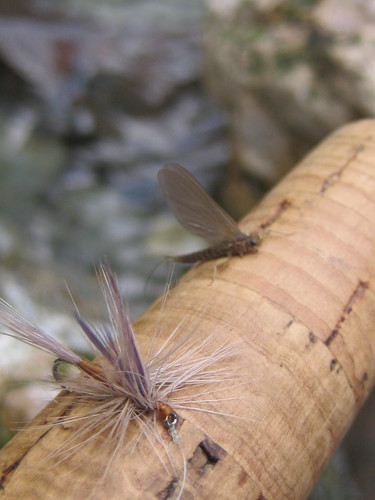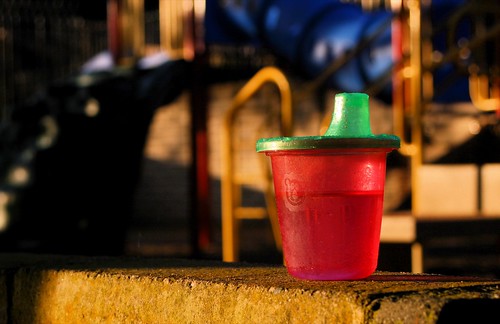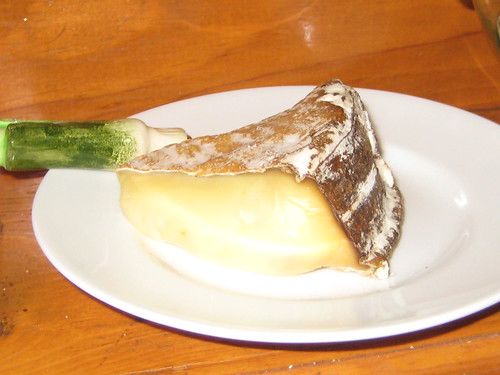 I don't think I've mentioned it before on this blog, but I am an avid angler, with a particularly fondness for fish that eat flies. The village of Plaisance, France, where we spent the first part of our recent vacation, is situated on a small, cold stream that cuts through the limestone laden valley (in the Haut Languedoc region of the country). It is called "Le Bouissou." My former coworker, Edie, who lent us her townhouse for the week, mentioned that there were trout in the river, so, prior to leaving for France, I eagerly packed my short 3 weight rod and a small box of dry flies.
I don't think I've mentioned it before on this blog, but I am an avid angler, with a particularly fondness for fish that eat flies. The village of Plaisance, France, where we spent the first part of our recent vacation, is situated on a small, cold stream that cuts through the limestone laden valley (in the Haut Languedoc region of the country). It is called "Le Bouissou." My former coworker, Edie, who lent us her townhouse for the week, mentioned that there were trout in the river, so, prior to leaving for France, I eagerly packed my short 3 weight rod and a small box of dry flies.
The weekend we arrived it was cold and rainy, and several scouting trips to the stream yielded no more than a few minnow sightings. However, on day three the sun came out and I did manage to find a few small trout sipping tiny may flies near the main bridge in town. The sunny, warm weather held, so the following afternoon I headed upstream from Plaisance to a promising run near the village soccer field. It was a postcard perfect afternoon of angling. Big may flies started hatching as soon as I assembled my rod, so it took no more than three or four casts to land my first fish, a small rainbow - no doubt imported from American stocks (rainbows are not native to Europe, just as brown trout are not native to US waters). I later caught three chunky brown trout - truites farios in French - in the same run. I celebrated with an obligatory cold Leffe beer.
 Before packing up for dinner, an old French fly fisherman started fishing the run below me, and once we made eye contact he walked up the bank to ask how the fishing was. Upon seeing the cold, whiteness of my Minnesota legs, and uninsulated Chaco sandals, he proceeded to ask me "Bonjour, mais où sont tes waders? (Hello. Where are you waders?)" I explained that I was traveling from abroad and didn't have the space in my luggage to bring more than a rod, reel, and some flies. He chuckled and wished me a "un après-midi chaud" (a warm afternoon).
Before packing up for dinner, an old French fly fisherman started fishing the run below me, and once we made eye contact he walked up the bank to ask how the fishing was. Upon seeing the cold, whiteness of my Minnesota legs, and uninsulated Chaco sandals, he proceeded to ask me "Bonjour, mais où sont tes waders? (Hello. Where are you waders?)" I explained that I was traveling from abroad and didn't have the space in my luggage to bring more than a rod, reel, and some flies. He chuckled and wished me a "un après-midi chaud" (a warm afternoon).
France is full of fishermen, and the French fish with their stomaches, even though a hand may be holding the rod. This is commendable, as it appears more French anglers are looking to fool a few trout for dinner, rather than catch and release every fish in the river, so any fixation they have around "numbers" has not been apparent to me. Also, France has managed to preserve a large number of beautiful trout streams, most of which hold good populations of native brown trout. Many people in the US find hard to believe. It seems there is a common misconception that the French countryside is overly grazed and domesticated. While farms and herd animals are ubiquitous across the provinces, there are some expansive pockets of wilderness, a lot of which is located in or near the Pyrenees. In fact, a wild boar hunter was killed last year near Plaisance while tracking a large wounded male. It attacked him before he could drop it, and its teeth severed a femoral artery. The hunter bled out before officials could find him. A wild place indeed.
Check out this this photo set for more fishing pix from the trip.
P.S. I would have included a recipe for grilled trout had I kept one for the table. The fact of the matter is, I decided to fish sans permet, as the short-term, out-of-country licences were not available until May 1, and an annual non-resident licence costs about $90 - mon dieu! For that reason I decided to release the small number of trout I did hook. I'll be sure to post a trout recipe this summer, as I have big plans to catch dinner in Wisconsin in coming weeks.
 The June issue of the Minnesota Women's Press contains a news brief about a very progressive piece of legislation, the Toxic Free Kids Act, that was recently signed into law. From the article:
The June issue of the Minnesota Women's Press contains a news brief about a very progressive piece of legislation, the Toxic Free Kids Act, that was recently signed into law. From the article:



